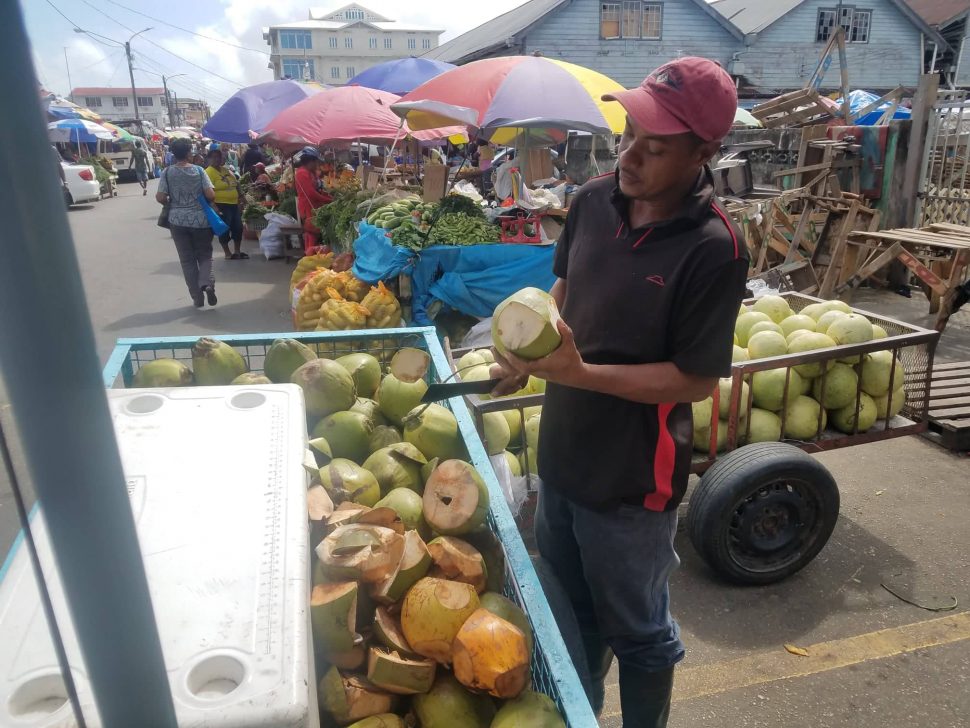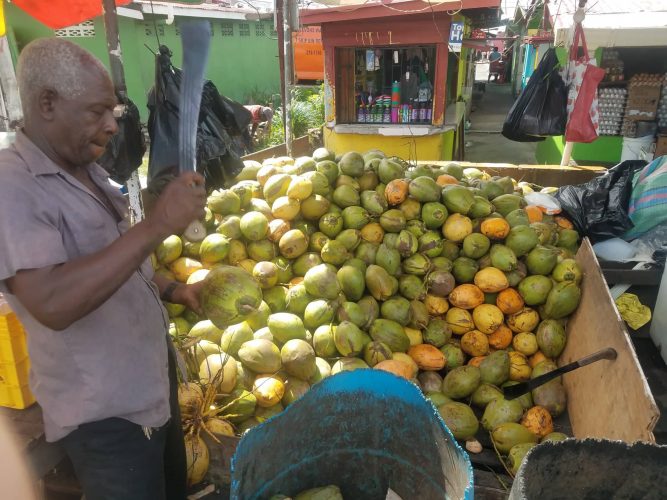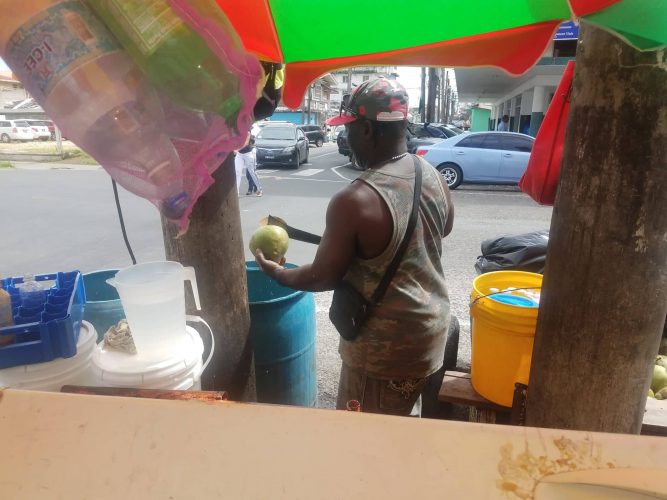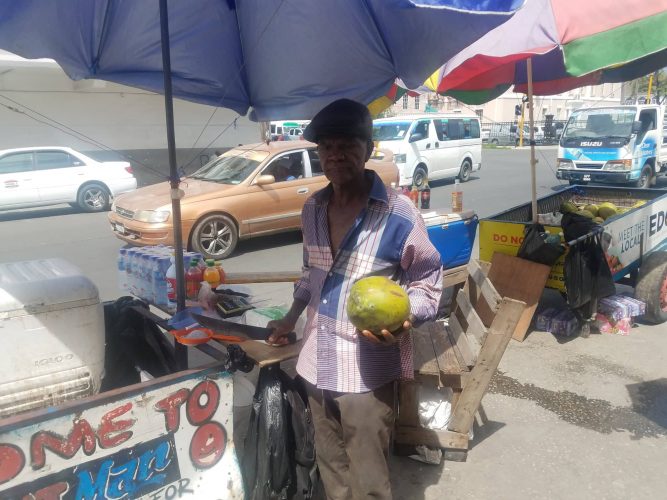Coconut prices have increased significantly over the last year but the exact reason for the bump is not clear though some vendors blame the rise in fuel prices in 2018 while others cite a hike in exports.
Consumer demand for coconuts, specifically the coconut water, has increased over the years as persons are now more aware of its many health benefits. Over the past year, it has been observed that the prices for the water-bearing nut have increased. Vendors, who sell coconuts in and around Georgetown, gave various reasons for this.
Roy (only name given), who sells coconuts on a push cart around the city, told Stabroek News that the prices for his coconuts have increased as the farmer he purchases from has also hiked his price citing the higher cost of fuel. The man revealed that he sources his coconuts from the Pomeroon and a few years ago and even up to one year ago, prices were significantly lower. He said the cost of transporting the coconuts to Georgetown went up and this had an impact on the price.
“The price increase yes, is because the gas price gone up, so we gotta pay the farmer them more to get the coconut from Pomeroon to Georgetown. Coconut deh plenty, is just that it slow, so is nah like the demand make the price go up. This coconut raise October month, all my coconut I sell for $200,” said Roy.
Another vendor who has his cart positioned at the corner of Robb and Wellington Streets shared similar thoughts. According to the vendor, just about six months ago, he sold coconuts for $160 but due to the fact that the farmers have raised their prices, he had to raise his price to turn a profit. He added that fuel prices fluctuate but even though the price subsequently dropped, the coconut prices remained high.
Roy has been a coconut vendor for nine years and said that it is now his career. According to him, he prefers to sell coconuts from the Pomeroon because it has the best quality. “Only Pomeroon coconuts I does sell, nowhere else, it got the best quality of nut that’s what the customers would know and it more sweet too,” he said.
Roy, who takes his business all over Georgetown, said that he operates daily until he has sold all of the coconuts he buys from the farmers daily.
Another vendor, K. Baichan said, “Only one thing does cause the increase: that’s gasoline, in terms of transportation to bring it from Pomeroon by boat or truck. Right now we got a problem with the boat because of at the back of big market deh but most everybody sending they thing by truck now cause it more economical and more simple.”
According to Baichan, business has been slow and generally not like what it used to be when he started out in the trade some 10 years ago. ‘’All like how this year break hay now, coconut business gon drop back, business gon pick up till after coming on to Mash,’’ he said.
“When I first start selling coconut, it was $40, we used to buy from the farmer for $40, we does pay we own truck and handling and so. The problem we got is every time gas go up; the coconut don’t raise you know, the freight for the boat raise, now when the freight for the boat raise, de man gas raise too fuh bring it, so which mean they does add it on now to the load so you gotta pay extra,” said Baichan.
Even though he sells coconuts from the Pomeroon, Baichan said that the ‘creole coconut’ which is usually grown on the East Coast Demerara is a better coconut generally. “I gon be real with yuh, the creole coconut is a better coconut but the water, the amount of the water is the thing. Pomeroon people how they breeding this thing (coconuts) hay is fuh do this kinda work, for a man buy a coconut and drink and go bout he business. East Coast coconut now, most people (breeding) it for dry coconut like to cook with and them thing, make coconut oil and so, this hay (Pomeroon coconuts) is better for water purpose,” he said.
Another vendor who has been selling coconuts for over 30 years, believes that the exportation of coconuts does not significantly affect his business. “The export of coconut don’t really bother we, Guyana get nuff coconut. When yuh hear coconut price raise is that gas raise. Cause it coming from duh distance (Pomeroon), if the fuel price raise yuh must put on something pon de price,” said Ron Braithwaite who operates in the Stabroek Market area. Braithwaite also believes that the demand for coconuts has increased. “Remember people getting sensitised that coconut good for them and so you find that people drinking more coconuts than long ago,” he said.
Trinidad
Meantime, coconut vendor Floyd Williams who operates his business at the corner of Church Street and Orange Walk, believes coconut exports are to blame for the rise in prices. “Well the farmers getting a better price in the river than when they bring it out on the landing. Boat buying it from Trinidad, ship it outside and some people go in the river and buy it in the river,” he said. Williams said that he only sells Pomeroon coconuts as he prefers the quality compared to the others.
Orin Blair agrees with Williams as to why the price has increased. “It’s the export market, they getting a better price from the foreigners. The farmers them in the Pomeroon wah get about 30 or 40 acres of coconut, they exporting all de coconut so we the vendors ain’t getting,” he contended. Blair, who has been making a living as a coconut vendor for 27 years and has his stand located on High Street at the side of Ashmins building, said that the prices increased around one year ago. Another factor mentioned by vendors as to what could’ve caused the increase in price was the weather.
According to Malcolm Toppin, who operates his business at the corner of Charlotte and Camp Streets, he was told by his supplier that the weather has affected the supply of coconuts. “Is because of the weather them ain’t getting de supply that they want,” he said. Toppin has been a vendor for three years and said that since he started out, business has always been on and off and sales would only increase significantly during hot days and holiday seasons when foreigners come to Guyana.
One sentiment echoed among all coconut vendors was their hope for the prices to not increase further as that may have a horrible effect on their businesses.









